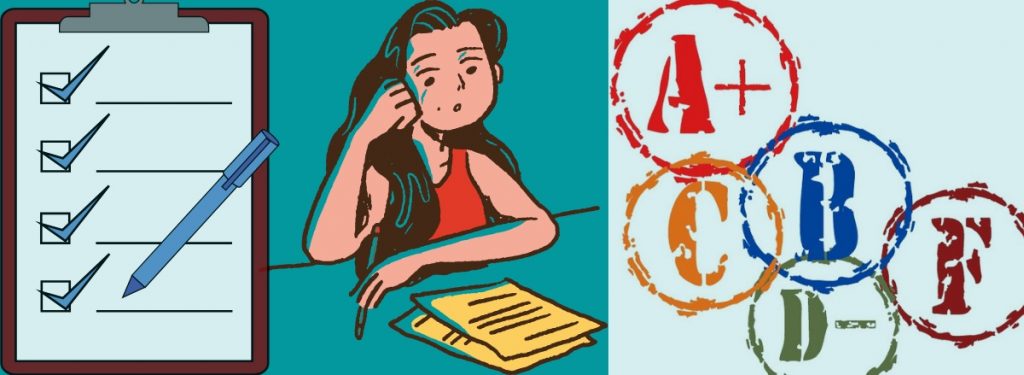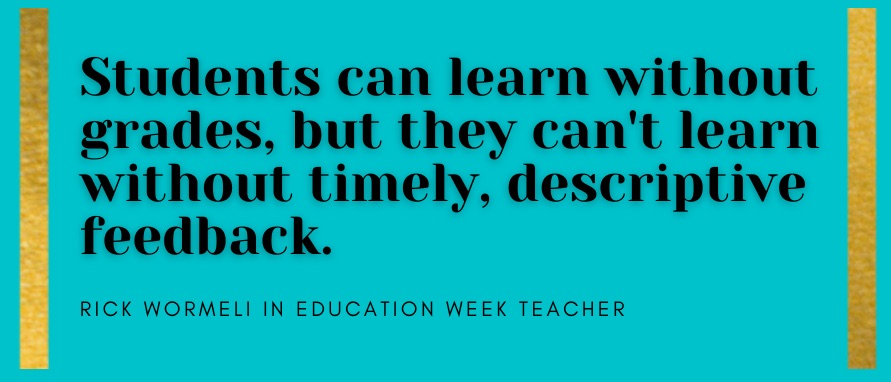Students’ reactions to grading are measured against their own expectations for themselves, and also how they think they relate to others in their social circle. So the information provided by grading of any sort is interpreted in that light, not just in relation to formal success criteria.

The home learning situation has caused us to look again at matters that we often take for granted. Sometimes we have re-affirmed thinking but other times challenged it. Here I want to explore frequency of grading which has arisen as a point of discussion. How often should we give students grades for their work? I think you can tell my general direction from the title, but let’s start from another angle to establish an important point.
A familiar feature in teaching is to re-visit a previously-learnt topic, to address it in greater depth, or from a different perspective, and to find that even motivated students find it hard to avoid slipping into the habit of thinking “I already know this” and therefore reduce effort. The basic point is an obvious one – that like all of us, students are always determining where to focus effort. If and when they see little return for hard work in any specific area it is absolutely rational to reduce attention to that area. Students are not machines to be directed at learning material irrespective of its perceived relevance or importance to them – nor would we want them to be! They are people acting on the basis of their own ideas of what is and is not important, and we need to bear this in mind, as teachers and as parents.
This idea has some interesting implications when it comes to assessment and grading. A pure grading model might be based on a process of giving students an assignment, making success criteria clear, showing exemplar work and asking students to undertake work which can then be graded. According to this way of thinking, the grade provides valuable information that allows students to identify next steps for improvement. Alas the compelling clarity of this model is its weakness because it fails to recognise the earlier point – that there’s a lot more going on for students than rubrics and criteria. Their reaction to grades is not an abstract informational reaction, but a socially embedded one.
Most importantly, and rightly or wrongly, students’ reactions to grading are at least in part measured against their own expectations for themselves, and also how they think they relate to others in their social circle (which is why students and parents are often so keen to compare grades). So the information provided by grading of any sort is interpreted in that light, not just in relation to formal success criteria. And as such, the outcomes of grading can be very different to what we expect.
Researcher Ghazala Azmat and her team did an ingenious experiment which periodically provided students with their grading information, controlled against a group which got no such information. According to the pure model, this information should have added value because it provided student with a clearer sense of where they were and how to improve; the group with more information should have done better over time. But in fact students who got extra information tended to do worse than those who had none.

It turns out that many students had underestimated how well they were doing, before the grading. And so when they found out that they were doing as well as or better than they had thought, rather than raise their aspirations, they simply saw that they had reached or exceeded them. And so the obvious and rational response was to reduce effort – with the long term effect of reducing attainment. It is true that there was a smaller group who had overestimated their position, and so the grading did cause them to increase their effort – but this group was smaller than the other group, and so the net effect was negative. This experiment shows clearly that it is the students who are doing well who are most vulnerable to the baleful effects of grading.
This data is from undergraduates, and with data shared every six months. Long term, the students would have overall been better off not knowing the grades. Does this translate to schools? Perhaps. I can certainly think of students who switch off when they get an unexpected strong result. Furthermore, other research tells us, and our own data confirms, that teachers tend to be slightly over-generous with student grading. It’s understandable – teachers like to give students the benefit of any doubt. But that makes it even more likely that students will feel they have done better than they might have expected – perhaps with damaging long term effects.
An obvious solution here it seems to me, is to give feedback that involves helping students understand the strengths and weaknesses of their work without reference to a grade, %, rank or even position on a rubric. That involves moving a focus away from external points of reference to points that are intrinsic to the piece itself – so rather than saying “this is a 6 on this rubric” we say “the narrative thread in essay is too hard to follow”. It does means an explicit reliance on professional judgement, rather than hiding it away buried in what only appears to be a more objective process. It does mean that students and parents have no way to compare themselves directly with each other. This seems like a good thing to me, but it would be a big change for some. In many (most?) schools it would also enhance relationships encourages conversations between student and teacher.
We have generally left a lot of grading decisions to individuals and departments, but I wonder if (for this and other reasons I have outlined over the years in previous posts) a clear and unambiguous “you may not give grades except at these times and in these situations….” would provide a welcome clarity and enhance learning and school culture a great deal.
Note: This article was originally published in May 2020 in Nick’s personal blog ‘Education, Schools and Culture’. Please visit his blog for more such profound thoughts and deep insights into many things related to Education.
Bibliography
- Azmat, G. et al (2016) What You Don‘t Know… Can‘t Hurt You? A Field Experiment on Relative Performance Feedback in Higher Education Institute for the Study of Labour
- Kluger, A., DeNisi, A., (1996)The Effects of Feedback Interventions on Performance: A Historical Review, a Meta-Analysis, and a Preliminary Feedback Intervention Theor
Nick has taught in holistic, values-driven schools schools since 1995, first teaching Theory of Knowledge and Mathematics at UWCSEA Dover and subsequently at the International School of Geneva in Switzerland. After working as Director of IB at Sevenoaks School, UK, and as Dean of Studies at the Aga Khan Academy in Mombasa, Kenya, Nick returned to Singapore to lead a team establishing the UWCSEA East High School in 2012 as the High School Principal. He was appointed Deputy Head of East Campus in 2016 and took up the position of Head of East Campus in January 2021.
IB Chief Assessor for Theory of Knowledge from 2005 to 2010 and Vice Chair of the IB Examining Board from 2007 to 2013, he is a textbook author, IB examiner, workshop leader and consultant who writes and speaks widely on various educational matters.
Nick has a bachelor’s degree in Natural Sciences from Fitzwilliam College, Cambridge, postgraduate certificates in Engineering and Education from Wolfson College, Cambridge and Manchester College, Oxford and a Master’s in Educational Leadership from the Open University.
An avid reader, Nick also enjoys running in the heat, evening walks in the cool and baking bread each weekend. His three children enjoy activities from volleyball to podcasting to drumming, and Ellie, his wife, is Director of Teaching and Learning on Dover Campus. As a family they enjoy travelling across the region (when they can!), sampling new food, and enjoying the great outdoors.

